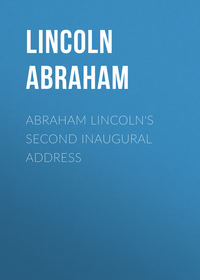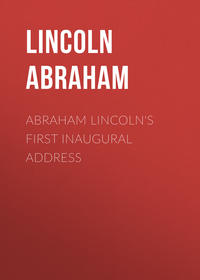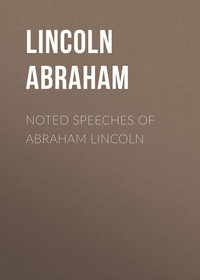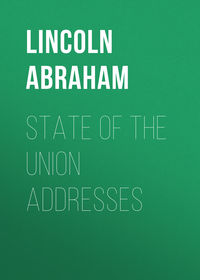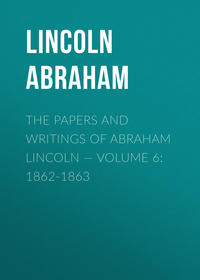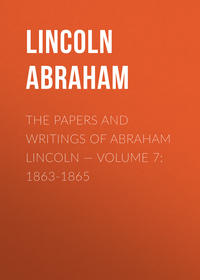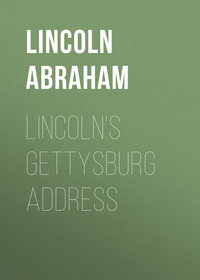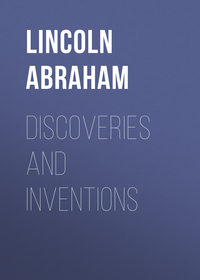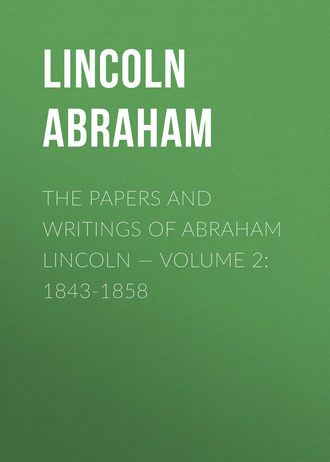 полная версия
полная версияThe Papers And Writings Of Abraham Lincoln — Volume 2: 1843-1858
And not only so, but the framers of the Constitution were particular to keep out of that instrument the word "slave," the reason being that slavery would ultimately come to an end, and they did not wish to have any reminder that in this free country human beings were ever prostituted to slavery. [Applause.] Nor is it any argument that we are superior and the negro inferior — that he has but one talent while we have ten. Let the negro possess the little he has in independence; if he has but one talent, he should be permitted to keep the little he has. [Applause: ] But slavery will endure no test of reason or logic; and yet its advocates, like Douglas, use a sort of bastard logic, or noisy assumption it might better be termed, like the above, in order to prepare the mind for the gradual, but none the less certain, encroachments of the Moloch of slavery upon the fair domain of freedom. But however much you may argue upon it, or smother it in soft phrase, slavery can only be maintained by force — by violence. The repeal of the Missouri Compromise was by violence. It was a violation of both law and the sacred obligations of honor, to overthrow and trample under foot a solemn compromise, obtained by the fearful loss to freedom of one of the fairest of our Western domains. Congress violated the will and confidence of its constituents in voting for the bill; and while public sentiment, as shown by the elections of 1854, demanded the restoration of this compromise, Congress violated its trust by refusing simply because it had the force of numbers to hold on to it. And murderous violence is being used now, in order to force slavery on to Kansas; for it cannot be done in any other way. [Sensation.]
The necessary result was to establish the rule of violence — force, instead of the rule of law and reason; to perpetuate and spread slavery, and in time to make it general. We see it at both ends of the line. In Washington, on the very spot where the outrage was started, the fearless Sumner is beaten to insensibility, and is now slowly dying; while senators who claim to be gentlemen and Christians stood by, countenancing the act, and even applauding it afterward in their places in the Senate. Even Douglas, our man, saw it all and was within helping distance, yet let the murderous blows fall unopposed. Then, at the other end of the line, at the very time Sumner was being murdered, Lawrence was being destroyed for the crime of freedom. It was the most prominent stronghold of liberty in Kansas, and must give way to the all-dominating power of slavery. Only two days ago, Judge Trumbull found it necessary to propose a bill in the Senate to prevent a general civil war and to restore peace in Kansas.
We live in the midst of alarms; anxiety beclouds the future; we expect some new disaster with each newspaper we read. Are we in a healthful political state? Are not the tendencies plain? Do not the signs of the times point plainly the way in which we are going? [Sensation.]
In the early days of the Constitution slavery was recognized, by South and North alike, as an evil, and the division of sentiment about it was not controlled by geographical lines or considerations of climate, but by moral and philanthropic views. Petitions for the abolition of slavery were presented to the very first Congress by Virginia and Massachusetts alike. To show the harmony which prevailed, I will state that a fugitive slave law was passed in 1793, with no dissenting voice in the Senate, and but seven dissenting votes in the House. It was, however, a wise law, moderate, and, under the Constitution, a just one. Twenty-five years later, a more stringent law was proposed and defeated; and thirty-five years after that, the present law, drafted by Mason of Virginia, was passed by Northern votes. I am not, just now, complaining of this law, but I am trying to show how the current sets; for the proposed law of 1817 was far less offensive than the present one. In 1774 the Continental Congress pledged itself, without a dissenting vote, to wholly discontinue the slave trade, and to neither purchase nor import any slave; and less than three months before the passage of the Declaration of Independence, the same Congress which adopted that declaration unanimously resolved "that no slave be imported into any of the thirteen United Colonies." [Great applause.]
On the second day of July, 1776, the draft of a Declaration of Independence was reported to Congress by the committee, and in it the slave trade was characterized as "an execrable commerce," as "a piratical warfare," as the "opprobrium of infidel powers," and as "a cruel war against human nature." [Applause.] All agreed on this except South Carolina and Georgia, and in order to preserve harmony, and from the necessity of the case, these expressions were omitted. Indeed, abolition societies existed as far south as Virginia; and it is a well-known fact that Washington, Jefferson, Madison, Lee, Henry, Mason, and Pendleton were qualified abolitionists, and much more radical on that subject than we of the Whig and Democratic parties claim to be to-day. On March 1, 1784, Virginia ceded to the confederation all its lands lying northwest of the Ohio River. Jefferson, Chase of Maryland, and Howell of Rhode Island, as a committee on that and territory thereafter to be ceded, reported that no slavery should exist after the year 1800. Had this report been adopted, not only the Northwest, but Kentucky, Tennessee, Alabama, and Mississippi also would have been free; but it required the assent of nine States to ratify it. North Carolina was divided, and thus its vote was lost; and Delaware, Georgia, and New Jersey refused to vote. In point of fact, as it was, it was assented to by six States. Three years later on a square vote to exclude slavery from the Northwest, only one vote, and that from New York, was against it. And yet, thirty-seven years later, five thousand citizens of Illinois, out of a voting mass of less than twelve thousand, deliberately, after a long and heated contest, voted to introduce slavery in Illinois; and, to-day, a large party in the free State of Illinois are willing to vote to fasten the shackles of slavery on the fair domain of Kansas, notwithstanding it received the dowry of freedom long before its birth as a political community. I repeat, therefore, the question: Is it not plain in what direction we are tending? [Sensation.] In the colonial time, Mason, Pendleton, and Jefferson were as hostile to slavery in Virginia as Otis, Ames, and the Adamses were in Massachusetts; and Virginia made as earnest an effort to get rid of it as old Massachusetts did. But circumstances were against them and they failed; but not that the good will of its leading men was lacking. Yet within less than fifty years Virginia changed its tune, and made negro-breeding for the cotton and sugar States one of its leading industries. [Laughter and applause.]
In the Constitutional Convention, George Mason of Virginia made a more violent abolition speech than my friends Lovejoy or Codding would desire to make here to-day — a speech which could not be safely repeated anywhere on Southern soil in this enlightened year. But, while there were some differences of opinion on this subject even then, discussion was allowed; but as you see by the Kansas slave code, which, as you know, is the Missouri slave code, merely ferried across the river, it is a felony to even express an opinion hostile to that foul blot in the land of Washington and the Declaration of Independence. [Sensation.]
In Kentucky — my State — in 1849, on a test vote, the mighty influence of Henry Clay and many other good then there could not get a symptom of expression in favor of gradual emancipation on a plain issue of marching toward the light of civilization with Ohio and Illinois; but the State of Boone and Hardin and Henry Clay, with a nigger under each arm, took the black trail toward the deadly swamps of barbarism. Is there — can there be — any doubt about this thing? And is there any doubt that we must all lay aside our prejudices and march, shoulder to shoulder, in the great army of Freedom? [Applause.]
Every Fourth of July our young orators all proclaim this to be "the land of the free and the home of the brave!" Well, now, when you orators get that off next year, and, may be, this very year, how would you like some old grizzled farmer to get up in the grove and deny it? [Laughter.] How would you like that? But suppose Kansas comes in as a slave State, and all the "border ruffians" have barbecues about it, and free-State men come trailing back to the dishonored North, like whipped dogs with their tails between their legs, it is — ain't it? — evident that this is no more the "land of the free"; and if we let it go so, we won't dare to say "home of the brave" out loud. [Sensation and confusion.]
Can any man doubt that, even in spite of the people's will, slavery will triumph through violence, unless that will be made manifest and enforced? Even Governor Reeder claimed at the outset that the contest in Kansas was to be fair, but he got his eyes open at last; and I believe that, as a result of this moral and physical violence, Kansas will soon apply for admission as a slave State. And yet we can't mistake that the people don't want it so, and that it is a land which is free both by natural and political law. No law, is free law! Such is the understanding of all Christendom. In the Somerset case, decided nearly a century ago, the great Lord Mansfield held that slavery was of such a nature that it must take its rise in positive (as distinguished from natural) law; and that in no country or age could it be traced back to any other source. Will some one please tell me where is the positive law that establishes slavery in Kansas? [A voice: "The bogus laws."] Aye, the bogus laws! And, on the same principle, a gang of Missouri horse-thieves could come into Illinois and declare horse-stealing to be legal [Laughter], and it would be just as legal as slavery is in Kansas. But by express statute, in the land of Washington and Jefferson, we may soon be brought face to face with the discreditable fact of showing to the world by our acts that we prefer slavery to freedom — darkness to light! [Sensation.]
It is, I believe, a principle in law that when one party to a contract violates it so grossly as to chiefly destroy the object for which it is made, the other party may rescind it. I will ask Browning if that ain't good law. [Voices: "Yes!"] Well, now if that be right, I go for rescinding the whole, entire Missouri Compromise and thus turning Missouri into a free State; and I should like to know the difference — should like for any one to point out the difference — between our making a free State of Missouri and their making a slave State of Kansas. [Great applause.] There ain't one bit of difference, except that our way would be a great mercy to humanity. But I have never said, and the Whig party has never said, and those who oppose the Nebraska Bill do not as a body say, that they have any intention of interfering with slavery in the slave States. Our platform says just the contrary. We allow slavery to exist in the slave States, not because slavery is right or good, but from the necessities of our Union. We grant a fugitive slave law because it is so "nominated in the bond"; because our fathers so stipulated — had to — and we are bound to carry out this agreement. But they did not agree to introduce slavery in regions where it did not previously exist. On the contrary, they said by their example and teachings that they did not deem it expedient — did n't consider it right — to do so; and it is wise and right to do just as they did about it. [Voices: "Good!"] And that it what we propose — not to interfere with slavery where it exists (we have never tried to do it), and to give them a reasonable and efficient fugitive slave law. [A voice: "No!"] I say YES! [Applause.] It was part of the bargain, and I 'm for living up to it; but I go no further; I'm not bound to do more, and I won't agree any further. [Great applause.]
We, here in Illinois, should feel especially proud of the provision of the Missouri Compromise excluding slavery from what is now Kansas; for an Illinois man, Jesse B. Thomas, was its father. Henry Clay, who is credited with the authorship of the Compromise in general terms, did not even vote for that provision, but only advocated the ultimate admission by a second compromise; and Thomas was, beyond all controversy, the real author of the "slavery restriction" branch of the Compromise. To show the generosity of the Northern members toward the Southern side: on a test vote to exclude slavery from Missouri, ninety voted not to exclude, and eighty-seven to exclude, every vote from the slave States being ranged with the former and fourteen votes from the free States, of whom seven were from New England alone; while on a vote to exclude slavery from what is now Kansas, the vote was one hundred and thirty-four for, to forty-two against. The scheme, as a whole, was, of course, a Southern triumph. It is idle to contend otherwise, as is now being done by the Nebraskites; it was so shown by the votes and quite as emphatically by the expressions of representative men. Mr. Lowndes of South Carolina was never known to commit a political mistake; his was the great judgment of that section; and he declared that this measure "would restore tranquillity to the country — a result demanded by every consideration of discretion, of moderation, of wisdom, and of virtue." When the measure came before President Monroe for his approval, he put to each member of his cabinet this question: "Has Congress the constitutional power to prohibit slavery in a Territory?" And John C. Calhoun and William H. Crawford from the South, equally with John Quincy Adams, Benjamin Rush, and Smith Thompson from the North, alike answered, "Yes!" without qualification or equivocation; and this measure, of so great consequence to the South, was passed; and Missouri was, by means of it, finally enabled to knock at the door of the Republic for an open passage to its brood of slaves. And, in spite of this, Freedom's share is about to be taken by violence — by the force of misrepresentative votes, not called for by the popular will. What name can I, in common decency, give to this wicked transaction? [Sensation.]
But even then the contest was not over; for when the Missouri constitution came before Congress for its approval, it forbade any free negro or mulatto from entering the State. In short, our Illinois "black laws" were hidden away in their constitution [Laughter], and the controversy was thus revived. Then it was that Mr. Clay's talents shone out conspicuously, and the controversy that shook the union to its foundation was finally settled to the satisfaction of the conservative parties on both sides of the line, though not to the extremists on either, and Missouri was admitted by the small majority of six in the lower House. How great a majority, do you think, would have been given had Kansas also been secured for slavery? [A voice: "A majority the other way."] "A majority the other way," is answered. Do you think it would have been safe for a Northern man to have confronted his constituents after having voted to consign both Missouri and Kansas to hopeless slavery? And yet this man Douglas, who misrepresents his constituents and who has exerted his highest talents in that direction, will be carried in triumph through the State and hailed with honor while applauding that act. [Three groans for "Dug!"] And this shows whither we are tending. This thing of slavery is more powerful than its supporters — even than the high priests that minister at its altar. It debauches even our greatest men. It gathers strength, like a rolling snowball, by its own infamy. Monstrous crimes are committed in its name by persons collectively which they would not dare to commit as individuals. Its aggressions and encroachments almost surpass belief. In a despotism, one might not wonder to see slavery advance steadily and remorselessly into new dominions; but is it not wonderful, is it not even alarming, to see its steady advance in a land dedicated to the proposition that "all men are created equal"? [Sensation.]
It yields nothing itself; it keeps all it has, and gets all it can besides. It really came dangerously near securing Illinois in 1824; it did get Missouri in 1821. The first proposition was to admit what is now Arkansas and Missouri as one slave State. But the territory was divided and Arkansas came in, without serious question, as a slave State; and afterwards Missouri, not, as a sort of equality, free, but also as a slave State. Then we had Florida and Texas; and now Kansas is about to be forced into the dismal procession. [Sensation.] And so it is wherever you look. We have not forgotten — it is but six years since — how dangerously near California came to being a slave State. Texas is a slave State, and four other slave States may be carved from its vast domain. And yet, in the year 1829, slavery was abolished throughout that vast region by a royal decree of the then sovereign of Mexico. Will you please tell me by what right slavery exists in Texas to-day? By the same right as, and no higher or greater than, slavery is seeking dominion in Kansas: by political force — peaceful, if that will suffice; by the torch (as in Kansas) and the bludgeon (as in the Senate chamber), if required. And so history repeats itself; and even as slavery has kept its course by craft, intimidation, and violence in the past, so it will persist, in my judgment, until met and dominated by the will of a people bent on its restriction.
We have, this very afternoon, heard bitter denunciations of Brooks in Washington, and Titus, Stringfellow, Atchison, Jones, and Shannon in Kansas — the battle-ground of slavery. I certainly am not going to advocate or shield them; but they and their acts are but the necessary outcome of the Nebraska law. We should reserve our highest censure for the authors of the mischief, and not for the catspaws which they use. I believe it was Shakespeare who said, "Where the offence lies, there let the axe fall"; and, in my opinion, this man Douglas and the Northern men in Congress who advocate "Nebraska" are more guilty than a thousand Joneses and Stringfellows, with all their murderous practices, can be. [Applause.]
We have made a good beginning here to-day. As our Methodist friends would say, "I feel it is good to be here." While extremists may find some fault with the moderation of our platform, they should recollect that "the battle is not always to the strong, nor the race to the swift." In grave emergencies, moderation is generally safer than radicalism; and as this struggle is likely to be long and earnest, we must not, by our action, repel any who are in sympathy with us in the main, but rather win all that we can to our standard. We must not belittle nor overlook the facts of our condition — that we are new and comparatively weak, while our enemies are entrenched and relatively strong. They have the administration and the political power; and, right or wrong, at present they have the numbers. Our friends who urge an appeal to arms with so much force and eloquence should recollect that the government is arrayed against us, and that the numbers are now arrayed against us as well; or, to state it nearer to the truth, they are not yet expressly and affirmatively for us; and we should repel friends rather than gain them by anything savoring of revolutionary methods. As it now stands, we must appeal to the sober sense and patriotism of the people. We will make converts day by day; we will grow strong by calmness and moderation; we will grow strong by the violence and injustice of our adversaries. And, unless truth be a mockery and justice a hollow lie, we will be in the majority after a while, and then the revolution which we will accomplish will be none the less radical from being the result of pacific measures. The battle of freedom is to be fought out on principle. Slavery is a violation of the eternal right. We have temporized with it from the necessities of our condition; but as sure as God reigns and school children read, THAT BLACK FOUL LIE CAN NEVER BE CONSECRATED INTO GOD'S HALLOWED TRUTH! [Immense applause lasting some time.]
One of our greatest difficulties is, that men who know that slavery is a detestable crime and ruinous to the nation are compelled, by our peculiar condition and other circumstances, to advocate it concretely, though damning it in the raw. Henry Clay was a brilliant example of this tendency; others of our purest statesmen are compelled to do so; and thus slavery secures actual support from those who detest it at heart. Yet Henry Clay perfected and forced through the compromise which secured to slavery a great State as well as a political advantage. Not that he hated slavery less, but that he loved the whole Union more. As long as slavery profited by his great compromise, the hosts of proslavery could not sufficiently cover him with praise; but now that this compromise stands in their way —
"...they never mention him, His name is never heard: Their lips are now forbid to speak That once familiar word."They have slaughtered one of his most cherished measures, and his ghost would arise to rebuke them. [Great applause.]
Now, let us harmonize, my friends, and appeal to the moderation and patriotism of the people: to the sober second thought; to the awakened public conscience. The repeal of the sacred Missouri Compromise has installed the weapons of violence: the bludgeon, the incendiary torch, the death-dealing rifle, the bristling cannon — the weapons of kingcraft, of the inquisition, of ignorance, of barbarism, of oppression. We see its fruits in the dying bed of the heroic Sumner; in the ruins of the "Free State" hotel; in the smoking embers of the Herald of Freedom; in the free-State Governor of Kansas chained to a stake on freedom's soil like a horse-thief, for the crime of freedom. [Applause.] We see it in Christian statesmen, and Christian newspapers, and Christian pulpits applauding the cowardly act of a low bully, WHO CRAWLED UPON HIS VICTIM BEHIND HIS BACK AND DEALT THE DEADLY BLOW. [Sensation and applause.] We note our political demoralization in the catch-words that are coming into such common use; on the one hand, "freedom-shriekers," and sometimes "freedom-screechers" [Laughter], and, on the other hand, "border-ruffians," and that fully deserved. And the significance of catch-words cannot pass unheeded, for they constitute a sign of the times. Everything in this world "jibes" in with everything else, and all the fruits of this Nebraska Bill are like the poisoned source from which they come. I will not say that we may not sooner or later be compelled to meet force by force; but the time has not yet come, and, if we are true to ourselves, may never come. Do not mistake that the ballot is stronger than the bullet. Therefore let the legions of slavery use bullets; but let us wait patiently till November and fire ballots at them in return; and by that peaceful policy I believe we shall ultimately win. [Applause.]
It was by that policy that here in Illinois the early fathers fought the good fight and gained the victory. In 1824 the free men of our State, led by Governor Coles (who was a native of Maryland and President Madison's private secretary), determined that those beautiful groves should never re-echo the dirge of one who has no title to himself. By their resolute determination, the winds that sweep across our broad prairies shall never cool the parched brow, nor shall the unfettered streams that bring joy and gladness to our free soil water the tired feet, of a slave; but so long as those heavenly breezes and sparkling streams bless the land, or the groves and their fragrance or memory remain, the humanity to which they minister SHALL BE FOREVER FREE! [Great applause] Palmer, Yates, Williams, Browning, and some more in this convention came from Kentucky to Illinois (instead of going to Missouri), not only to better their conditions, but also to get away from slavery. They have said so to me, and it is understood among us Kentuckians that we don't like it one bit. Now, can we, mindful of the blessings of liberty which the early men of Illinois left to us, refuse a like privilege to the free men who seek to plant Freedom's banner on our Western outposts? ["No!" "No!"] Should we not stand by our neighbors who seek to better their conditions in Kansas and Nebraska? ["Yes!" "Yes!"] Can we as Christian men, and strong and free ourselves, wield the sledge or hold the iron which is to manacle anew an already oppressed race? ["No!" "No!"] "Woe unto them," it is written, "that decree unrighteous decrees and that write grievousness which they have prescribed." Can we afford to sin any more deeply against human liberty? ["No!" "No!"]


